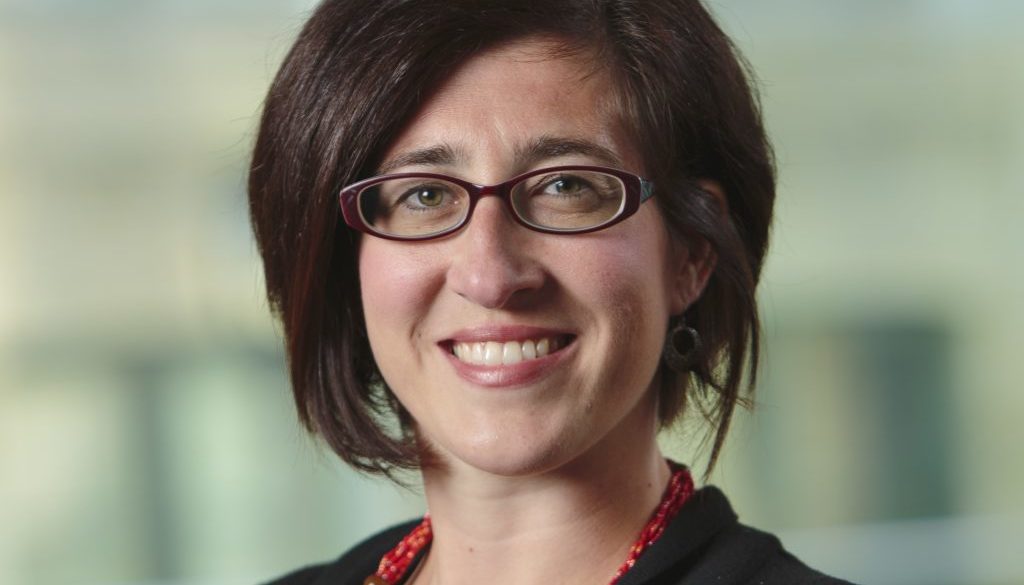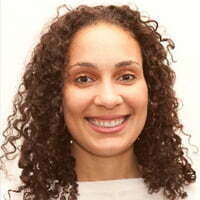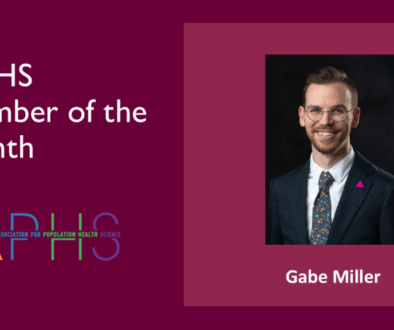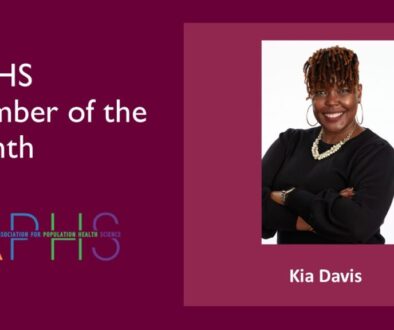Amanda M. Simanek is an Assistant Professor in the Joseph J. Zilber School of Public Health at the University of Wisconsin-Milwaukee. She is an Epidemiologist. She joined IAPHS in 2018. Learn more about Amanda on her website.
Tell us a little about yourself, where are you from, where did you go to graduate school, what makes you jump out of bed each morning?
Hello! I grew up in the Chicago suburbs, studied Women’s Studies/Political Science at University of Wisconsin-Madison, lived and worked in the San Francisco Bay Area and then attended University of Michigan for my MPH in International Health Epidemiology as well as PhD in Epidemiologic Science. It requires several cups of coffee for me to do any kind of jumping in the morning!
How do you define yourself as a population health professional?
I trained as a social epidemiologist in the Center for Social Epidemiology and Population Health at University of Michigan and my research focuses broadly on identifying novel biologic pathways by which the adverse effects of socioeconomic disadvantage on health are transmitted across generations and develop across the lifecourse, with a particular emphasis on studying the role of the immune system.
What disciplines do you engage with and are there disciplines that you would like to engage with?
My research integrates theoretical and methodological perspectives from epidemiology, sociology, immunology and psychology.
Describe a current project/initiative that you are excited about.
I recently received funding from the National Institute on Minority Health and Health Disparities to carry out a study in which I am examining the association between maternal socioeconomic disadvantage experienced at multiple levels during pregnancy and inflammatory response in offspring at birth, assessing whether this association is mediated by adverse birth outcomes such as preterm and small-for-gestational age birth, and whether these associations vary by child’s sex. This study utilizes existing birth certificate and census data on maternal socioeconomic disadvantage and links this information to archived neonatal bloodspots corresponding to a Michigan population-based sample of 1000 newborns that will be tested for markers of a pro-inflammatory phenotype at birth. In addition to answering these research questions in this cohort, I am pursuing additional funding to interrogate other biologic pathways by which the adverse effects of socioeconomic disadvantage on health are transmitted across generations such as via epigenetic alterations and to carry-out longitudinal follow-up of this cohort.
Name a population health professional who you admire and why?
At the last IAPHS meeting, I looked around and was awestruck by the number of people present that had at some point benefited from the tutelage of Ana Diez-Roux, whether as a Masters or PhD student, Postdoc or colleague. She has influenced a formidable group of individuals (many of whom are women and/or are otherwise historically underrepresented in the academy) and I really admire her for this, in addition to her important theoretical and methodological contributions to the field of social epidemiology.
How did you hear about IAPHS?/Why did you decide to become a member of IAPHS?
Current IAPHS members reached out to me about joining IAPHS and given the interdisciplinary nature of my research, it made complete sense to join!
Have you attended an IAPHS meeting? If so, what do you like most about these meeting?
I attended the annual IAPHS meeting for the first time this past October in Washington, DC and unlike other conferences in which there might be a handful of presentations that overlap with my research interests, every session offered something I wanted to hear about.
What would you tell someone who is considering joining IAPHS?
Attend a conference and you will be convinced to join!
What would you like to see IAPHS do in the future?
I am very excited that IAPHS is starting a formal mentoring program as I think interdisciplinary scholars that must navigate unique challenges in carrying out their research can really benefit from connecting with others further along in their careers. I look forward to participating as both a mentor and mentee!
Favorite population health relevant book:
Krieger, N. (2011). Epidemiology and the people’s health: Theory and context. New York, NY, US: Oxford University Press. http://dx.doi.org/10.1093/acprof:oso/9780195383874.001.0001
Favorite population health relevant article(s):
Link BG, Phelan J. Social conditions as fundamental causes of disease. J Health Soc Behav. 1995;Spec No:80-94. Review. PubMed PMID: 7560851.
Frohlich KL, Potvin L. Transcending the known in public health practice: the inequality paradox: the population approach and vulnerable populations. Am J Public Health. 2008 Feb;98(2):216-21. doi: 10.2105/AJPH.2007.114777. Epub 2008 Jan 2. PubMed PMID: 18172133; PubMed Central PMCID: PMC2376882.






All comments will be reviewed and posted if substantive and of general interest to IAPHS readers.